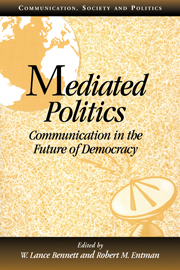Book contents
- Frontmatter
- Contents
- List of Figures
- List of Tables
- Contributors
- Preface
- Acknowledgments
- 1 Mediated Politics: An Introduction
- Part 1 Democracy and the Public Sphere
- Part 2 Citizens, Consumers, and Media in Transition
- Part 3 Mediated Political Information and Public Opinion
- 10 Reframing Public Opinion as We Have Known It
- 11 Political Waves and Democratic Discourse: Terrorism Waves During the Oslo Peace Process
- 12 Monica Lewinsky and the Mainsprings of American Politics
- 13 The Big Spin: Strategic Communication and the Transformation of Pluralist Democracy
- 14 The Impact of the New Media
- Part 4 Mediated Campaigns
- Part 5 Citizens: Present and Future
- Index
10 - Reframing Public Opinion as We Have Known It
Published online by Cambridge University Press: 05 June 2012
- Frontmatter
- Contents
- List of Figures
- List of Tables
- Contributors
- Preface
- Acknowledgments
- 1 Mediated Politics: An Introduction
- Part 1 Democracy and the Public Sphere
- Part 2 Citizens, Consumers, and Media in Transition
- Part 3 Mediated Political Information and Public Opinion
- 10 Reframing Public Opinion as We Have Known It
- 11 Political Waves and Democratic Discourse: Terrorism Waves During the Oslo Peace Process
- 12 Monica Lewinsky and the Mainsprings of American Politics
- 13 The Big Spin: Strategic Communication and the Transformation of Pluralist Democracy
- 14 The Impact of the New Media
- Part 4 Mediated Campaigns
- Part 5 Citizens: Present and Future
- Index
Summary
The continuing controversies over media effects on public opinion and democracy can be traced in part to uncertainties about what public opinion is. “Public opinion” is a useful fiction that actually refers to several distinct phenomena, many of them crucially shaped by the current media system. The process of framing – selecting, highlighting, and sorting into a coherent narrative some facts or observations and deleting many others – is critical to the formation of this convenient fiction. Yet the framing process could be altered dramatically by new channels and processes of mediated communication. If that happens, public opinion as we have known it will likely be transformed, altering the way democracy has (imperfectly) worked since mass media became central to its operation. We shall differentiate public opinion, by which we mean the loose, usually undefined, and thoroughly protean term used by just about everyone from academics to journalists to citizens and politicans, from four referents that we define more precisely. Once we understand these distinctions we can understand better how current mass media influence politics, and how well the public gets represented in a democratic political process shaped by the traditional mass media. Profound changes in the media system now underway demand both far greater conceptual clarity and creative new means of getting at the theoretical concerns that underlie social scientists’ longstanding attention to the role of public opinion in democracy.
Those invoking public opinion seem usually to mean the comprehensive preferences of the majority of individuals on an issue.
- Type
- Chapter
- Information
- Mediated PoliticsCommunication in the Future of Democracy, pp. 203 - 225Publisher: Cambridge University PressPrint publication year: 2000
- 20
- Cited by

